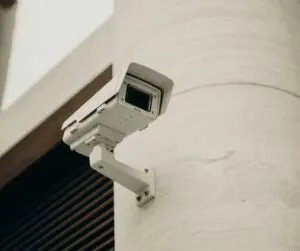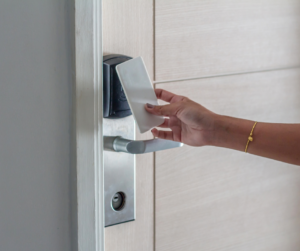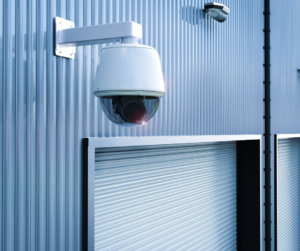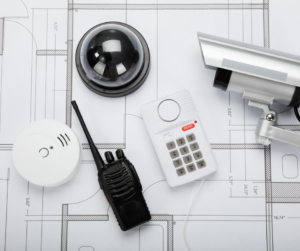It’s a fear most of us have — become a victim of a crime and getting injured as a result. But what if your injury could have been prevented if proper security measures in place? You would probably feel angry and upset. No one deserves to be injured because of negligence. It’s time to take action with a negligent security lawyer.
When people visit a place of business or lodging, you have the right to expect a reasonable amount of safety. In fact, property owners have a duty to secure their premises and protect lawful visitors and patrons from foreseeable harm.
Most premises liability cases involve “accidents,” or unintended consequences of careless property owners. But what happens if you are the victim of an intentional act – a violent crime on someone’s property or at a place of business? In some cases, these kinds of attacks could have been prevented if only there had been adequate security measures in place. If you or someone you love were seriously hurt because of negligent or inadequate security, you may be able to file a lawsuit against the property owner for damages.
Since 1959, the personal injury lawyers at Munley Law Personal Injury Attorneys have been fighting for the rights of clients who were injured as a result of someone else’s negligence. An experienced negligent security lawyer will fight to hold the negligent party accountable, and ensure you and your family receive the maximum compensation you deserve. If you think you may have a negligent security lawsuit, contact Munley Law Personal Injury Attorneys for a free consultation.
What is Negligent Security?
According to premises liability law, property owners are required to make their property free from hazards for lawful visitors and patrons. This applies to owners of retail stores, bars and nightclubs, apartment buildings, hotels, nursing homes, office buildings, and more. Landlords and businesses need to make sure proper security measures are put in place to protect tenants, clients, employees, and customers. A failure to implement reasonable security measures can result in a negligent security lawsuit.
Examples of Negligent Security
Negligent security can take many forms. Types of properties and places where inadequate security can result in a lawsuit include: 
- Hotels and motels
- Apartment complexes
- Office buildings
- Parking lots and parking garages
- Nightclubs and bars
- Retail stores and shopping centers
- Entertainment venues like stadiums, clubs, and arenas
- Nursing homes and hospitals
- Schools
Some examples of inadequate security include:
- No security cameras or too few security cameras
- Broken or absent door locks
- Failure to respond to a breach in security, such as a broken lock or stolen keys or security code
- Failure to repair or replace broken locks, doors, windows, or lights
- Lack of security policies or protocols
- Lack of security personnel
- Improperly trained security staff
- Inadequate lighting, especially in parking lots, walkways, or high-traffic areas
In addition, property owners can be held responsible if their staff fails to prevent your injury because of inadequate or lack of training. Negligent hiring and training practices can result in serious harm to patrons and visitors to an establishment.
Types of injuries caused by negligent security
When a business or residential property fails to provide appropriate security, people can suffer all kinds of negative consequences. People can suffer from personal attacks as in a fight or a stabbing, or from mass violence like a shooting or bombing. Common injuries resulting from negligent security include broken bones, internal bleeding, stabs, cuts, lacerations, gunshot wounds, sexual assault, spinal cord injury, concussion and traumatic head injury, and death. Victims of a robbery or assault often experience post traumatic stress disorder as well.
Who is Responsible if You are Assaulted or Attacked in Public Because of Inadequate Security?
If you are intentionally harmed by another individual in a public place or business, the assailant should be held criminally responsible for their actions. However, the owner or manager of the property can also be held civilly responsible for an assault that took place on their property if they failed to provide adequate security.
What You Need to Prove in a Negligent Security Lawsuit
To bring a successful lawsuit, it is not enough to show that you suffered an attack or injury on someone else’s property. In order to prove negligence in a personal injury case, the victim must prove the following four elements:
Duty – The plaintiff (victim) must prove that the defendant (property owner) owed a duty of care. In premises liability cases, you can do this by showing that you were a lawful visitor or invited guest (in other words, you were not trespassing or breaking the law). Trespassers are typically not permitted to bring a lawsuit against a property owner. Property owners have a duty to rid their premises of hazards that could harm their patrons, tenants, and guests.
Breach – You will need to prove that the property owner violated or breached their duty. To do this, your negligent security lawyer will establish that the property contained some feature or condition that made it unsafe, such as a lack of adequate security. We will also show that the property owner knew or should have known about the dangerous condition on their property.
Causation – We will then need to show that the property owner’s failure to maintain a safe environment directly caused you to suffer serious injuries.
Damages – Finally, we will need to show that you suffered economic and non-economic damages as a result of your injuries. This is where we calculate the ways in which your injury has affected your life.
Foreseeability – In negligent security cases, foreseeability is an important element. In order to make a case for negligent security, you will need to demonstrate that the property owner should have known that the risk for injury necessitated additional security measures. Foreseeability is influenced by what a reasonable person could predict, as well as historical information about the risk for criminal activity in a given location.
For instance, a reasonable person could foresee that someone might fall in an unlit stairwell. Banks foresee the risk of robbery by virtue of the large amounts of money they have on the premises. The manager of an apartment complex that has experienced a break-in can foresee that criminal activity is a possibility and they should therefore notify tenants, and change door locks and/or security passcodes for the building.
Whatever the case, you and your negligent security lawyer will need to show that the landowner or proprietor failed to exercise reasonable care to discover similar prior criminal activities or failed to give adequate warnings so visitors could avoid injury.
How a Negligent Security Attorney Can Help You
In order to prove the above elements of a personal injury case and win your negligent security claim, you will need an experienced and highly skilled negligent security lawyer on your side. Here are the ways a negligent security lawyer will help you:
Investigate – When pursuing a negligent security case, it’s not uncommon for the business owner or property manager in question to dispute your side of the story. There may be conflicting accounts of what happened and how you were injured. Your personal injury team at Munley Law Personal Injury Attorneys can investigate the series of events that lead to your injuries to prove who should be held responsible.
We can obtain security camera footage, witness statements, photos, and other data to build a complete picture of what happened. We will examine what kinds of security measures were in place, and what kinds of security measures should have been in place. We will also identify all possible defendants in your case. In addition to the property owner, you may have a case against the building management company, security contractors, or other parties.
Advise You – Your words and actions following an injury can be extremely important, especially if criminal charges are involved. It is crucial that you not say or do anything that could cast doubt on your account of the incident. Having an experienced attorney on your side can help ensure that you know what to expect and what your rights are each step of the way. You can avoid damaging your case by deferring to your lawyer and focusing on healing from your injuries. And, we will ensure that you take all necessary steps on the correct timeline so your case progresses as quickly as possible.
Calculate Damages – The legal team at Munley Law Personal Injury Attorneys understand that a serious injury can have far-reaching consequences for years to come. We work with medical experts and economic consultants to calculate the full extent of your damages and fight to get you maximum compensation.
Negotiate with the Insurance Company – There’s no need for you to deal with the property owner’s insurance company on your own. We will handle the settlement negotiations on your behalf so you can focus on healing from your injuries. We will never accept an offer of settlement without consulting with you first.
Jury Trial – Not all personal injury lawyers are ready to take your case to trial. Munley Law Personal Injury Attorneys is different. All of our attorneys have extensive courtroom experience, and are prepared to bring your case to trial if that’s what it takes to get you the compensation you are owed.
The premises liability lawyers at Munley Law Personal Injury Attorneys have successfully handled cases involving negligent security. Our board-certified trial lawyers have the experience, the resources, and the legal acumen to obtain justice for you and your family.
Damages in a Negligent Security Case
In a personal injury case involving negligent security, victims can sue for economic and noneconomic damages. Economic damages are the financial losses you have suffered and the costs you have incurred because of your injury. These include medical bills, future medical treatment, psychological counseling, lost wages, and related costs. Noneconomic damages include pain and suffering, emotional distress, mental anguish, and altered quality of life.
In rare cases involving gross negligence (extreme recklessness or deliberate acts), victims may also sue for punitive damages. Punitive damages are not for the purpose of compensating the victim, but for the purpose of punishing corporate wrongdoing.
What Property Owners Can Do to Avoid a Negligent Security Lawsuit
As a business owner or landlord, you have a responsibility to provide a safe environment for invitees and tenants. This includes securing your property against foreseeable criminal activity. Consider the following measures to keep your property and invitees safe:
- Employ qualified, vetted, properly trained security personnel

- Install security cameras and an alarm system, and post signage to advertise that cameras are in use to deter trespassing and criminal activity
- Maintain functional locks on doors and windows
- Install lighting in parking lots, parking garages, and walkways
- Restrict duplication of keys to common areas
- Change security passcodes at regular intervals and/or following a security breach
Negligent Security FAQs
Q: What if I was injured because of negligent security on public property?
Injuries can happen if security is lacking in a government building, a school, or other public property. Cases involving negligent security on public property can be significantly more complicated than those involving an assault on private property. This is because government entities often have protections that limit their liability. There are also specific procedures that must be followed in order to file a claim against a government entity.
For example, plaintiffs must provide notice to the government entity within a fixed amount of time. An experienced negligent security lawyer can pursue the compensation you deserve and ensure all necessary steps are taken to maximize your chances of a full recovery.
Q: What if I was injured because of negligent security while working?
If you were injured because of negligent security while doing your job, your legal options will depend on where the injury took place. In most cases, workers’ compensation exists to cover employees who suffered an injury on the job. Workers’ comp will pay for your medical bills and your lost wages while you are unable to work due to a work-related injury. Because of workers’ compensation, you cannot sue your employer.
However, there are some situations where you can bring a personal injury lawsuit against a negligent third party. If your injury occurred on property outside of your place of work, you may be able to bring a premises liability case for negligent security against the property owner. For example, if you are a delivery driver and were assaulted while making a delivery to a factory that lacked appropriate security, then you could sue the owner of that factory. The first step to finding out what kinds of legal actions you can take is to schedule a free consultation with a lawyer at Munley Law Personal Injury Attorneys.
Q: Can I sue my building if I am attacked on the property?
Premises liability can be complicated, and every case is different. However, you may be able to bring a lawsuit against your building management company or landlord if you can demonstrate that their negligence resulted in direct harm to you in the form of an act of violence. For example, if you complain to your landlord about a broken lock and they fail to fix it in a timely manner, they could be liable for harm you suffer during a home invasion. Or, if you notify your building manager about suspicious activity or a break in and they refuse to address it, they could be responsible for resulting damages.
Q: How do I know if security was negligent?
To be sure, not all attacks that happen in a public place are the result of negligent security. Sometimes, all of the proper precautions are in place, and acts of violence still happen. There is also the issue of foreseeability. The level of security at a business or establishment should be aligned with the reasonably foreseeable level of risk of danger. Foreseeability is determined in part by whether other crimes had occurred in the same vicinity or location. It is also influenced by the nature of the business.
What constitutes “adequate” security will depend on the unique nature of the business or property. For example, banks tend to have robust security because they have large amounts of cash on the premises and are vulnerable to robbery. Bars, nightclubs, and concert venues that host large crowds of people employ security guards to prevent fights, the use of weapons, and disorderly conduct that can lead to an injury. A personal injury lawyer at Munley Law Personal Injury Attorneys can help you determine if security was lacking or absent in the situation that led to your injury, and the extent to which you have a claim against the property owner.
Q: What should I do if I was assaulted in a public place?
An assault in a public setting can be unexpected and frightening. You’re likely dealing with police and criminal investigators as well as seeking medical treatment for your injuries. However, there are a few additional steps you should take during this time to protect yourself. First, after any kind of assault or attack, contact the police and make an official incident report. This will establish the facts of what happened and will be a crucial piece of evidence later. If you are able, take photos and obtain witness statements.
Next, get medical attention right away. In the height of adrenaline, you may not yet realize the full extent of your injuries. But, head injuries and internal damage can cause serious harm if they are not treated as soon as possible. If your injuries are severe or life-threatening, of course, medical attention should be first priority. In the days and weeks following the incident, document all of your doctor visits, time missed from work, and any evidence of the inadequate security that contributed to your injury (lack of lights, locks, cameras, etc.).
You should also contact a negligent security lawyer as soon as possible to find out what your legal options are. You are not obligated to take any specific action and you do not need to pay for the consultation.
Q: What is the statute of limitations on negligent security cases?
In most personal injury cases in Pennsylvania, the statute of limitations is two years. That means you have two years from the date of the accident to file a lawsuit. However, that does not mean you can or should wait two years to call a lawyer. There are many steps that must be taken before a lawsuit can be filed.
In order to preserve and obtain evidence, and take all necessary steps in a timely manner, it is important to contact an attorney as soon as possible. In fact, it is never too early to contact a lawyer. Even if you don’t yet know the extent of your injuries or the results of the criminal investigation, an attorney can give you sound advice and protect your rights each step of the way.
Q: Do I have a criminal case or a civil case?
Depending on the circumstances of your injury, the answer may be: both. If you were the victim of a crime on someone else’s property, criminal charges will probably be filed. Criminal acts can also be the basis for a civil lawsuit. Typically, criminal charges are pursued by a government entity against the perpetrator of the crime. You can bring a civil suit against the negligent property owner regardless of whether the assailant is prosecuted or found guilty. For help sorting out who to name as the defendant in your case, a personal injury lawyer at Munley Law Personal Injury Attorneys can advise you.
A Scranton Negligent Security Lawyer at Munley Law Personal Injury Attorneys is Ready to Help
If you or a loved one has been a victim of a crime or injured as a result of a lack of security you may be entitled to financial compensation. For more than six decades, our personal injury attorneys at Munley Law Personal Injury Attorneys have fought for the rights of injury victims throughout Pennsylvania. With our award-winning staff, we are prepared to make sure you get the compensation that you and your family deserve.
Don’t wait another minute. Contact a negligent security lawyer at Munley Law Personal Injury Attorneys now for a free consultation. We do not collect a fee for our services unless we win your case.










